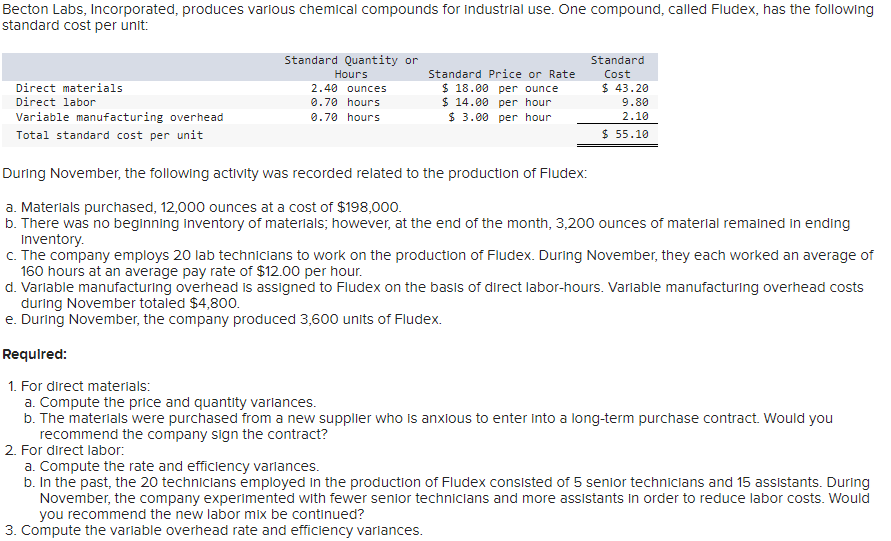



Becton Labs, Incorporated, produces various chemical compounds for industrial use. One compound, called Fludex, has the following standard cost per unit: During November, the following activity was recorded related to the production of Fludex: a. Materlals purchased, 12,000 ounces at a cost of $198,000. b. There was no beginning inventory of materlals; however, at the end of the month, 3,200 ounces of materlal remained in ending Inventory. c. The company employs 20 lab techniclans to work on the production of Fludex. During November, they each worked an average of 160 hours at an average pay rate of $12.00 per hour. d. Varlable manufacturing overhead is assigned to Fludex on the basis of direct labor-hours. Varlable manufacturing overhead costs during November totaled $4,800. e. During November, the company produced 3,600 units of Fludex. Requlred: 1. For direct materials: a. Compute the price and quantity varlances. b. The materials were purchased from a new supplier who is anxious to enter into a long-term purchase contract. Would you recommend the company sign the contract? 2. For direct labor: a. Compute the rate and efficlency varlances. b. In the past, the 20 techniclans employed in the production of Fludex consisted of 5 senior technicians and 15 assistants. During November, the company experimented with fewer senlor techniclans and more assistants in order to reduce labor costs. Would you recommend the new labor mix be continued? 3. Compute the variable overhead rate and efficiency variances. For direct materials, compute the price and quantity variances. Note: Indicate the effect of each variance by selecting "F" for favorable, "U" for unfavorable, and "None" for no effect (i.e., zero variance). Input all amounts as positive values. For direct labor, compute the rate and efficiency variances. Note: Indicate the effect of each variance by selecting "F" for favorable, " U " for unfavorable, and "None" for no effect (i.e., zero variance). Input all amounts as positive values. Compute the variable overhead rate and efficiency variances. Note: Indicate the effect of each variance by selecting "F" for favorable, "U" for unfavorable, and "None" for no effect (i.e., zero variance). Input all amounts as positive values










